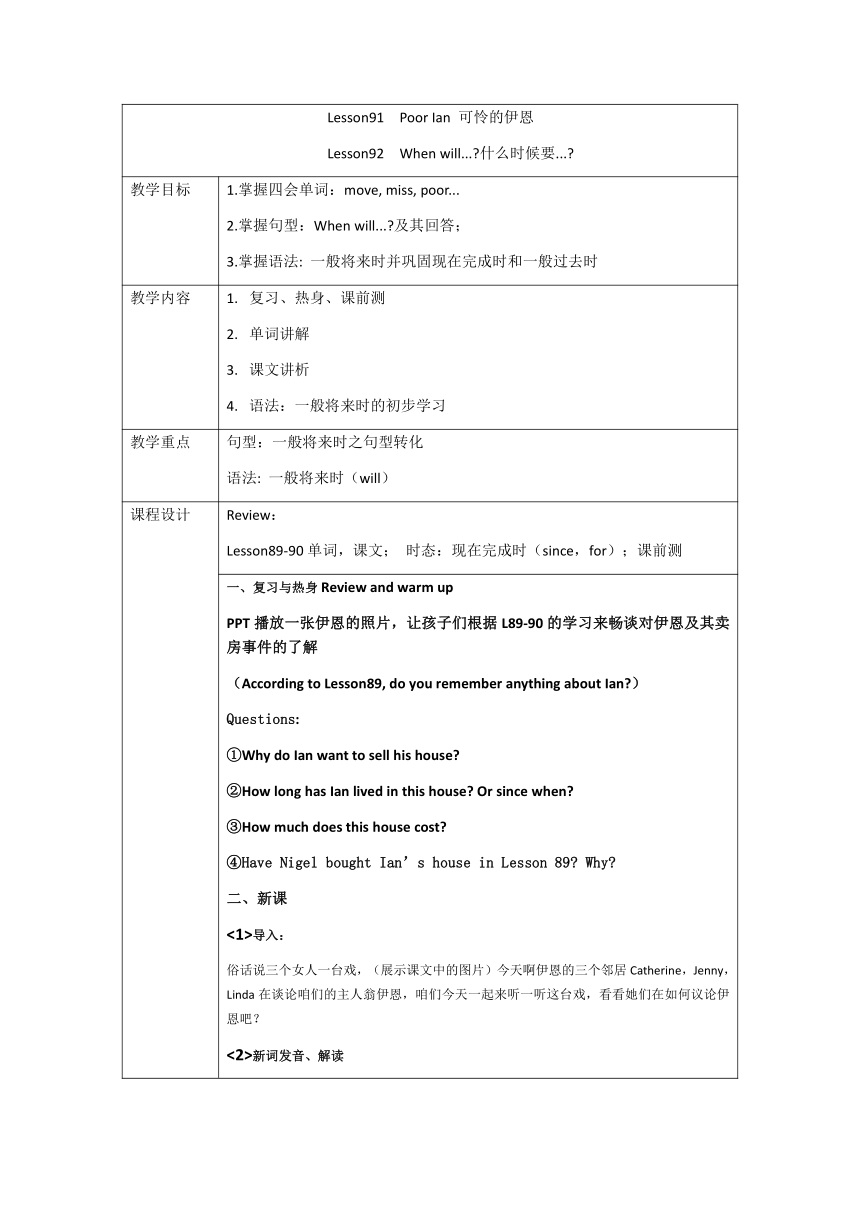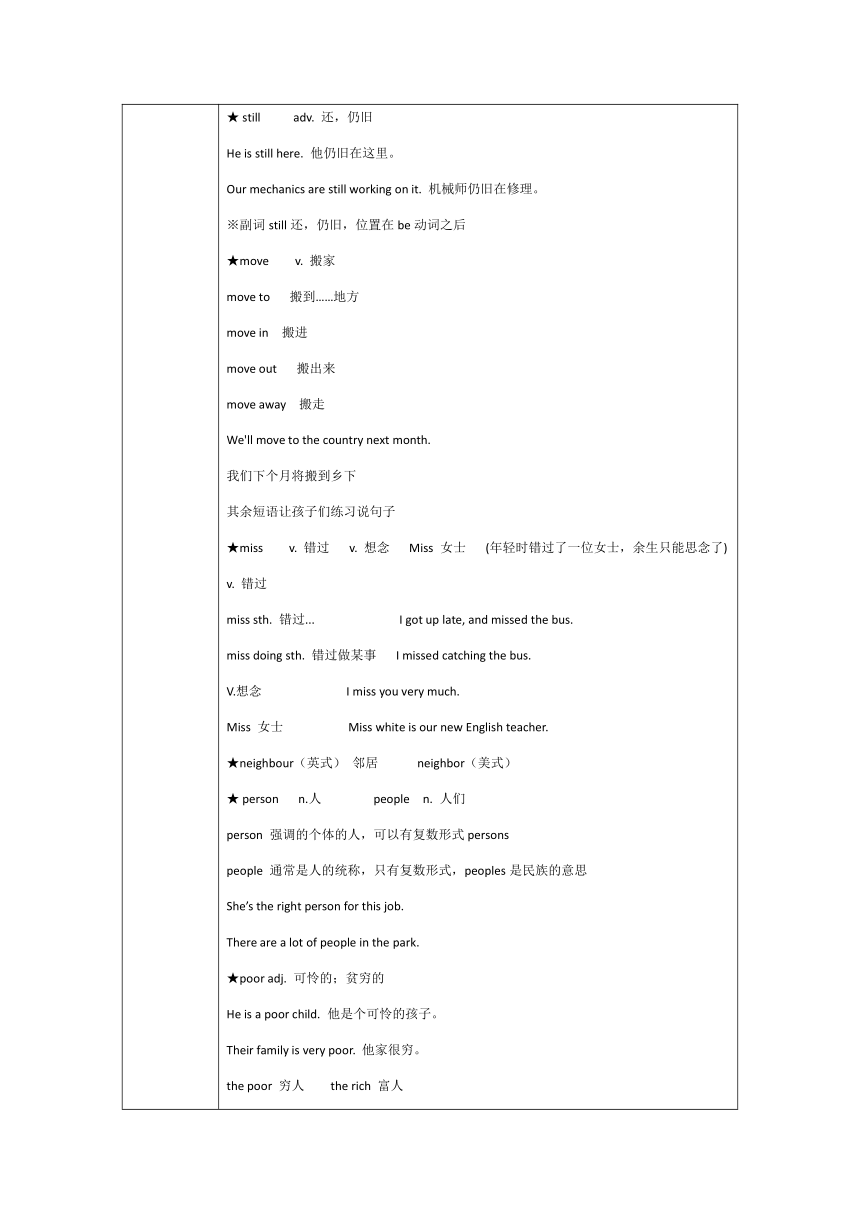小学英语新概念英语第一册 Lesson 91-92 表格式教案
文档属性
| 名称 | 小学英语新概念英语第一册 Lesson 91-92 表格式教案 |

|
|
| 格式 | docx | ||
| 文件大小 | 22.8KB | ||
| 资源类型 | 教案 | ||
| 版本资源 | 其它版本 | ||
| 科目 | 英语 | ||
| 更新时间 | 2024-04-11 00:00:00 | ||
图片预览


文档简介
Lesson91 Poor Ian 可怜的伊恩 Lesson92 When will... 什么时候要...
教学目标 1.掌握四会单词:move, miss, poor... 2.掌握句型:When will... 及其回答; 3.掌握语法: 一般将来时并巩固现在完成时和一般过去时
教学内容 复习、热身、课前测 单词讲解 课文讲析 语法:一般将来时的初步学习
教学重点 句型:一般将来时之句型转化 语法: 一般将来时(will)
课程设计 Review: Lesson89-90单词,课文; 时态:现在完成时(since,for);课前测
一、复习与热身Review and warm up PPT播放一张伊恩的照片,让孩子们根据L89-90的学习来畅谈对伊恩及其卖房事件的了解 (According to Lesson89, do you remember anything about Ian ) Questions: ①Why do Ian want to sell his house ②How long has Ian lived in this house Or since when ③How much does this house cost ④Have Nigel bought Ian’s house in Lesson 89 Why 新课 <1>导入: 俗话说三个女人一台戏,(展示课文中的图片)今天啊伊恩的三个邻居Catherine,Jenny,Linda在谈论咱们的主人翁伊恩,咱们今天一起来听一听这台戏,看看她们在如何议论伊恩吧? <2>新词发音、解读 ★ still adv. 还,仍旧 He is still here. 他仍旧在这里。 Our mechanics are still working on it. 机械师仍旧在修理。 ※副词still还,仍旧,位置在be动词之后 ★move v. 搬家 move to 搬到……地方 move in 搬进 move out 搬出来 move away 搬走 We'll move to the country next month. 我们下个月将搬到乡下 其余短语让孩子们练习说句子 ★miss v. 错过 v. 想念 Miss 女士 (年轻时错过了一位女士,余生只能思念了) v. 错过 miss sth. 错过... I got up late, and missed the bus. miss doing sth. 错过做某事 I missed catching the bus. V.想念 I miss you very much. Miss 女士 Miss white is our new English teacher. ★neighbour(英式) 邻居 neighbor(美式) ★ person n.人 people n. 人们 person 强调的个体的人,可以有复数形式persons people 通常是人的统称,只有复数形式,peoples是民族的意思 She’s the right person for this job. There are a lot of people in the park. ★poor adj. 可怜的;贫穷的 He is a poor child. 他是个可怜的孩子。 Their family is very poor. 他家很穷。 the poor 穷人 the rich 富人 带读单词,确认每个孩子都能正确发音,单词总回顾,做笔记! <3>课文学习 看课文视频,给出特定问题并回答 Q1.: Poor Ian? Ian is poor,why? Q3: When will Ian move to his new house Q2: Who wanted to sell the house 再听一遍音频,逐句跟读 精讲课文,板书和笔记(详见下文) CATHERINE: Has Ian sold his house yet (现在完成时) JENNY : Yes, he has. He sold it last week. (一般过去时) CATHERINE: Has he moved to his new house yet JENNY : No, not yet. He’s still here. He’s going to move tomorrow. 知识点: ※already用于肯定句句中,yet用于疑问句和否定句的句尾 ※Not yet. 完整: He has not moved to his new house yet. ※still 再复习下单词 ※be going to 计划,打算将要去做...(一般将来时) CATHERINE: When Tomorrow morning JENNY : No. Tomorrow afternoon. I’ll miss him. He has always been a good neighbour . LINDA : He’s a very nice person. We’ ll all miss him. 知识点: ※tomorrow morning 明天早上(将来的时间状语) He has always been a good neighbour . 现在完成时,指Ian自从在这住开始到现在一直都是很好的邻居。 ※ will aux. 将,将会 ※nice 表达人的人品很好可以用good或nice CATHERINE: When will the new people move into this house JENNY : I think that they will move in the day after tomorrow. LINDA : Will you see Ian today, Jenny JENNY : Yes, I will. LINDA : Please give him my regards. CATHERINE: Poor Ian ! He didn’t want to leave this house. JENNY : No, he didn’t want to leave, but his wife did! 知识点: ※move into 搬进... ※ move in 搬进来 (这里in是副词,而非介词,例如come in) ※the day after tomorrow 后天(将来的时间状语) ※Please give him my regards.请带我问候他.--Please give my regards to him. give sb. sth. = give sth. to sb. give后跟双宾语 ※Poor Ian ! poor在这里表同情 ※No,he didn’t.这是一个简短回答,它的问句其实是: He didn’t want to leave this house, did he?(反义疑问句,101课详细讲) 然后根据实际情况进行回答,“不,他不想离开。” 句子简单,让孩子们分角色来读课文或者跟音频逐句读 <4>语法学习 一般将来时 (the future tense)----由课文中出现的句子,或者更多例子来引入 含义:表将来会发生的动作或者会存在的状态 结构:1. 主语+be going to +动词原形+其他 (Lesson36-40) 2. 主语+will +动词原形+其他 (Lesson91-96) Will 将要,将会;是助动词,帮助实义动词构成一般将来时态,引导学生们说出否定句,一般疑问句,特殊疑问句的句型转化,注意will not=won’t 时态标志词:tomorrow系列(Lesson91); next系列(Lesson93) in+一段时间系列(Lesson95), 其他:in+将来时间,soon,in the future ※区分:be going to+动原,侧重计划,打算要去做某事 ※Practice makes perfect,多做练习
Summary ①New words and text ②Grammar:一般将来时
Homework ①背默L89-90 单词&课文 ②完成课课练 ③每日语音打卡
教学目标 1.掌握四会单词:move, miss, poor... 2.掌握句型:When will... 及其回答; 3.掌握语法: 一般将来时并巩固现在完成时和一般过去时
教学内容 复习、热身、课前测 单词讲解 课文讲析 语法:一般将来时的初步学习
教学重点 句型:一般将来时之句型转化 语法: 一般将来时(will)
课程设计 Review: Lesson89-90单词,课文; 时态:现在完成时(since,for);课前测
一、复习与热身Review and warm up PPT播放一张伊恩的照片,让孩子们根据L89-90的学习来畅谈对伊恩及其卖房事件的了解 (According to Lesson89, do you remember anything about Ian ) Questions: ①Why do Ian want to sell his house ②How long has Ian lived in this house Or since when ③How much does this house cost ④Have Nigel bought Ian’s house in Lesson 89 Why 新课 <1>导入: 俗话说三个女人一台戏,(展示课文中的图片)今天啊伊恩的三个邻居Catherine,Jenny,Linda在谈论咱们的主人翁伊恩,咱们今天一起来听一听这台戏,看看她们在如何议论伊恩吧? <2>新词发音、解读 ★ still adv. 还,仍旧 He is still here. 他仍旧在这里。 Our mechanics are still working on it. 机械师仍旧在修理。 ※副词still还,仍旧,位置在be动词之后 ★move v. 搬家 move to 搬到……地方 move in 搬进 move out 搬出来 move away 搬走 We'll move to the country next month. 我们下个月将搬到乡下 其余短语让孩子们练习说句子 ★miss v. 错过 v. 想念 Miss 女士 (年轻时错过了一位女士,余生只能思念了) v. 错过 miss sth. 错过... I got up late, and missed the bus. miss doing sth. 错过做某事 I missed catching the bus. V.想念 I miss you very much. Miss 女士 Miss white is our new English teacher. ★neighbour(英式) 邻居 neighbor(美式) ★ person n.人 people n. 人们 person 强调的个体的人,可以有复数形式persons people 通常是人的统称,只有复数形式,peoples是民族的意思 She’s the right person for this job. There are a lot of people in the park. ★poor adj. 可怜的;贫穷的 He is a poor child. 他是个可怜的孩子。 Their family is very poor. 他家很穷。 the poor 穷人 the rich 富人 带读单词,确认每个孩子都能正确发音,单词总回顾,做笔记! <3>课文学习 看课文视频,给出特定问题并回答 Q1.: Poor Ian? Ian is poor,why? Q3: When will Ian move to his new house Q2: Who wanted to sell the house 再听一遍音频,逐句跟读 精讲课文,板书和笔记(详见下文) CATHERINE: Has Ian sold his house yet (现在完成时) JENNY : Yes, he has. He sold it last week. (一般过去时) CATHERINE: Has he moved to his new house yet JENNY : No, not yet. He’s still here. He’s going to move tomorrow. 知识点: ※already用于肯定句句中,yet用于疑问句和否定句的句尾 ※Not yet. 完整: He has not moved to his new house yet. ※still 再复习下单词 ※be going to 计划,打算将要去做...(一般将来时) CATHERINE: When Tomorrow morning JENNY : No. Tomorrow afternoon. I’ll miss him. He has always been a good neighbour . LINDA : He’s a very nice person. We’ ll all miss him. 知识点: ※tomorrow morning 明天早上(将来的时间状语) He has always been a good neighbour . 现在完成时,指Ian自从在这住开始到现在一直都是很好的邻居。 ※ will aux. 将,将会 ※nice 表达人的人品很好可以用good或nice CATHERINE: When will the new people move into this house JENNY : I think that they will move in the day after tomorrow. LINDA : Will you see Ian today, Jenny JENNY : Yes, I will. LINDA : Please give him my regards. CATHERINE: Poor Ian ! He didn’t want to leave this house. JENNY : No, he didn’t want to leave, but his wife did! 知识点: ※move into 搬进... ※ move in 搬进来 (这里in是副词,而非介词,例如come in) ※the day after tomorrow 后天(将来的时间状语) ※Please give him my regards.请带我问候他.--Please give my regards to him. give sb. sth. = give sth. to sb. give后跟双宾语 ※Poor Ian ! poor在这里表同情 ※No,he didn’t.这是一个简短回答,它的问句其实是: He didn’t want to leave this house, did he?(反义疑问句,101课详细讲) 然后根据实际情况进行回答,“不,他不想离开。” 句子简单,让孩子们分角色来读课文或者跟音频逐句读 <4>语法学习 一般将来时 (the future tense)----由课文中出现的句子,或者更多例子来引入 含义:表将来会发生的动作或者会存在的状态 结构:1. 主语+be going to +动词原形+其他 (Lesson36-40) 2. 主语+will +动词原形+其他 (Lesson91-96) Will 将要,将会;是助动词,帮助实义动词构成一般将来时态,引导学生们说出否定句,一般疑问句,特殊疑问句的句型转化,注意will not=won’t 时态标志词:tomorrow系列(Lesson91); next系列(Lesson93) in+一段时间系列(Lesson95), 其他:in+将来时间,soon,in the future ※区分:be going to+动原,侧重计划,打算要去做某事 ※Practice makes perfect,多做练习
Summary ①New words and text ②Grammar:一般将来时
Homework ①背默L89-90 单词&课文 ②完成课课练 ③每日语音打卡
同课章节目录
